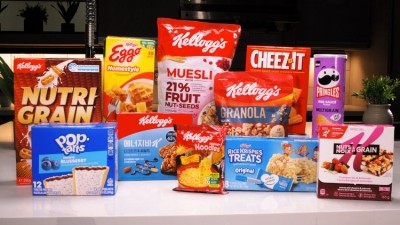Kellanova shareholders approve $35.9bn Mars merger amid shifting snack industry trends

During a special meeting on 1 November, over 99.5% of the 266.8 million votes cast supported the acquisition, according to Kellanova’s SEC filing. The vote represented around 77.5% of Kellanova’s outstanding common stock shares, underscoring strong shareholder confidence in the deal.
Virginia-headquartered Mars announced the acquisition on 14 August, which will see the publicly held snack giant brought under the Mars family’s ownership.
Read more: Snack attack: Is Mars’ $35.9bn bet on Kellanova the key to dominating the healthier snacks market?
Mars was founded in 1911 by Frank C. Mars in Tacoma, Washington. Initially, it started as a small operation producing butter cream candies in his home kitchen. It has since grown into one of the world’s largest privately-owned companies, having spun off into confectionery, pet care and food products. His descendants are now America’s second wealthiest family, with a collective net worth estimated at $117bn.
Mars CEO Poul Weihrauch – who has been with the company for 20 years – led the charge on the industry-changing takeover, poised to be the largest M&A deal in the food industry in 2024.
The acquisition process involved extensive negotiations, with Kellanova initially rejecting a $77 per share offer. Weihrauch responded with two higher bids but threatened to walk away when Kellanova suggested $85. With three other bidders in the mix, Mars ultimately agreed to the final offer of $83.50 per share in cash.
Strategic benefits of the acquisition
Mars’ expansion comes amid growing concerns about obesity, with weight-loss drugs like Wegovy and Ozempic shifting demand dynamics, raising questions about the future of the snack industry.
However, Weihrauch remains optimistic, citing rising interest in wholesome snacks like Kellanova’s Nutri-Grain. In August, he told the Financial Times, it was a “growing trend of snacking” that Mars plans to capitalise on.
The confectionery conglomerate has clearly indicated it will expand its Snacking division, aiming to double it in the coming decade. With the Kellanova bolt-on, Mars will add two iconic billion-dollar brands, Pringles and Cheez-It, and forge a stronger presence in the better-for-you category with RXBAR and Nutri-Grain. The integration will also debut Mars in new categories, including crackers, salty snacks, breakfast items and frozen foods with treats like Pop-Tarts, Eggo waffles and Rice Krispies Treats.
Read more: Buying habits: The snacks are a’ changing
Mars Snacking, under the leadership of global president Andrew Clarke, will oversee Kellanova’s integration. Its headquarters will be in Chicago. Following regulatory clearance and other customary closing conditions, the transaction is expected to close in the first half of 2025.
Pringles and Movember team up to support men’s mental health
Meanwhile, Pringles has once again teamed up with Movember to promote conversations around men’s mental health.
Since 2020, the initiative has generated nearly $2.3m in funds to support Movember’s mission to address mental health challenges through projects like the free-to-use Movember Conversations tool.
Last year, Pringles held its own events, including hosting ‘MOscars’ film screenings by the European Pringles team to inspire widespread awareness and raise funds across the continent. The UK saw success with its ‘Scan My Mo’ campaign, sparking over 127,000 meaningful conversations in major retailers like ASDA and Tesco. In Australia and New Zealand, the ‘Shave Down’ event raised more than $180,000, while North America partnered with OpTic Gaming, engaging over 25,000 gamers and raising $216,000. Additionally, Canadian teams raised CA$125,000 with the ‘I’m Fine’ social game campaign.
To mark its five-year milestone with Movember, Pringles has organised a virtual global relay called ‘Run With The Sun’ on 19 November. Beginning in Australia, the relay will span continents, concluding in the Americas. Local Kellanova offices will also host ‘Speakeasies’: 90-minute sessions led by mental health experts to encourage open conversations.
A shifting snacking landscape
Michigan-headquartered Kellanova reported a 6% increase in organic sales and a 16.1% boost in profits for Q3 2024, especially driven by strong demand for Pringles and Cheez-It. Although North American volumes dipped slightly by 0.5%, a 1.7% increase in pricing offset the impact, beating Wall Street’s projections.
Kellanova president and CEO Steve Cahillane said the results reflect the company’s “more growth-oriented and profitable portfolio as Kellanova” – referring to the October 2023 spinoff from Kellogg Co.
However, he also credited it as “a testament to the talent and engagement of a Kellanova organisation that is executing at a high level as we prepare for our exciting next chapter as part of a global snacking powerhouse with Mars.”
The earnings underscore the company’s resilience in a challenging economic climate, highlighting its ability to weather industry-wide pressures as consumers remain cautious with spending.
Thankfully, the industry is showing signs of recovery.
According to Circana, total food and beverage volume sales rose in Q3 2024, the first increase in three years. Core snack unit losses also moderated, from -1.8% in Q3 2023 to -0.8% in Q3 2024.
The potato chip category, in particular, saw a 7.1% increase in unit sales.
“Potato chips are a mature category and one of the largest in snacking, so this growth is encouraging for the industry,” David Walsh, VP of Membership & Communications for SNAC International, told attendees at the recent Pack Expo in Chicago.
Read more: How to be snack-savvy: Key insights for 2024
Other bright spots include meat snacks (+10.2%), savoury snacks (+2.5%) and dried fruit chips (+5.8%).
It’s understandable that interest in value-oriented formats remains – 50% of Americans now look for these options – however, Walsh said premium snacking continues to grow, with 56% of consumers willing to pay extra.
“Taste remains the top purchase driver, but health and sustainability factors are increasingly influential,” said Walsh, adding consumers are increasingly drawn to claims of high protein, low sugar and minimal processing.
Functional ingredients, too, are gaining traction. Adaptogens, mushrooms and probiotics are making their way into snacks, alongside simplified, natural ingredient lists. Walsh also pointed to experimental flavours such as caramel cheese and spicy options like Carolina reaper pepper.
“This high frequency of snacking creates opportunities for brands to meet diverse consumer needs: from indulgence to nutrition,” said Walsh.
Snacking has become integral to consumers’ daily routines, with 71% now snacking daily and nearly half snacking three or more times a day.














